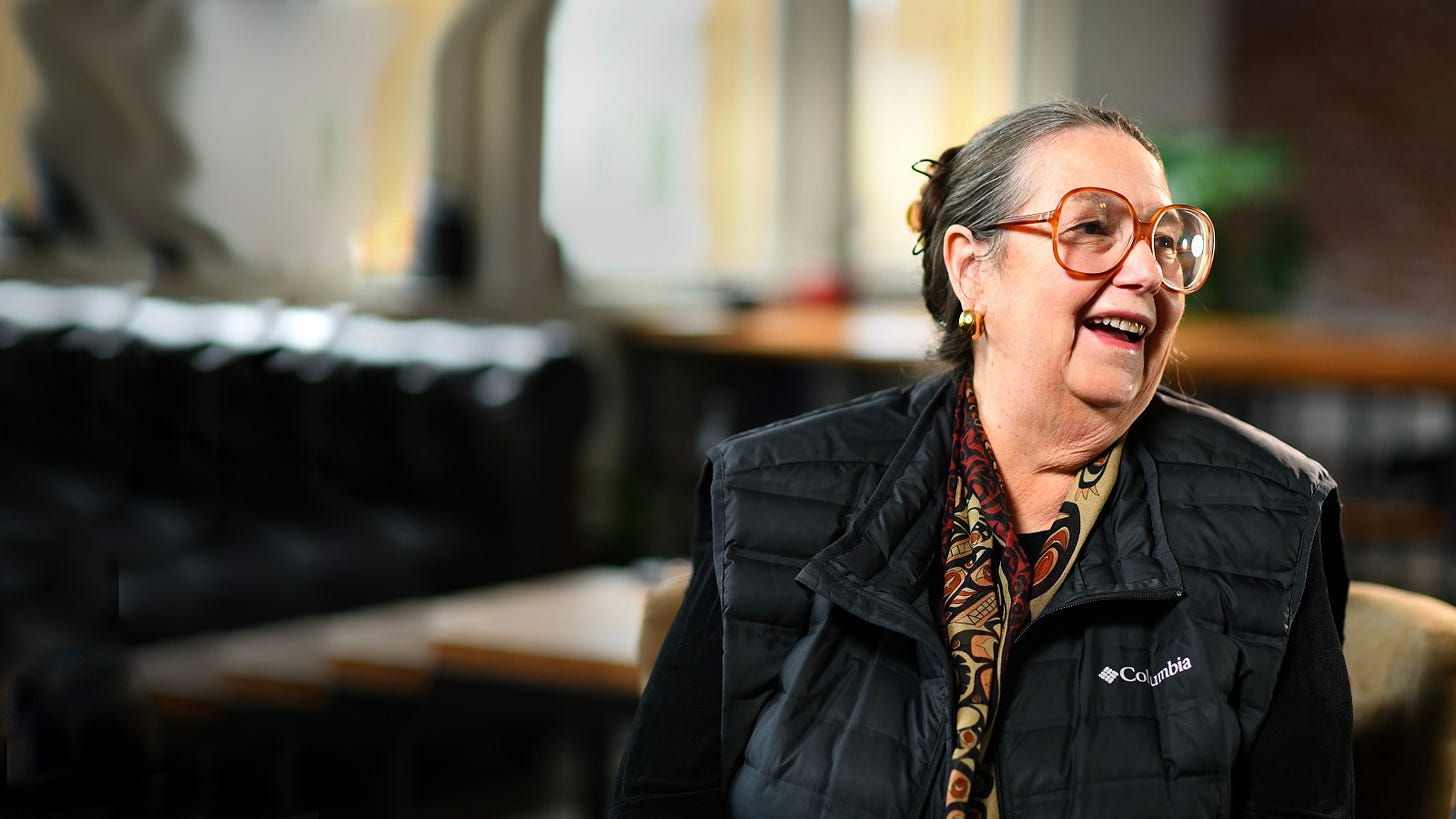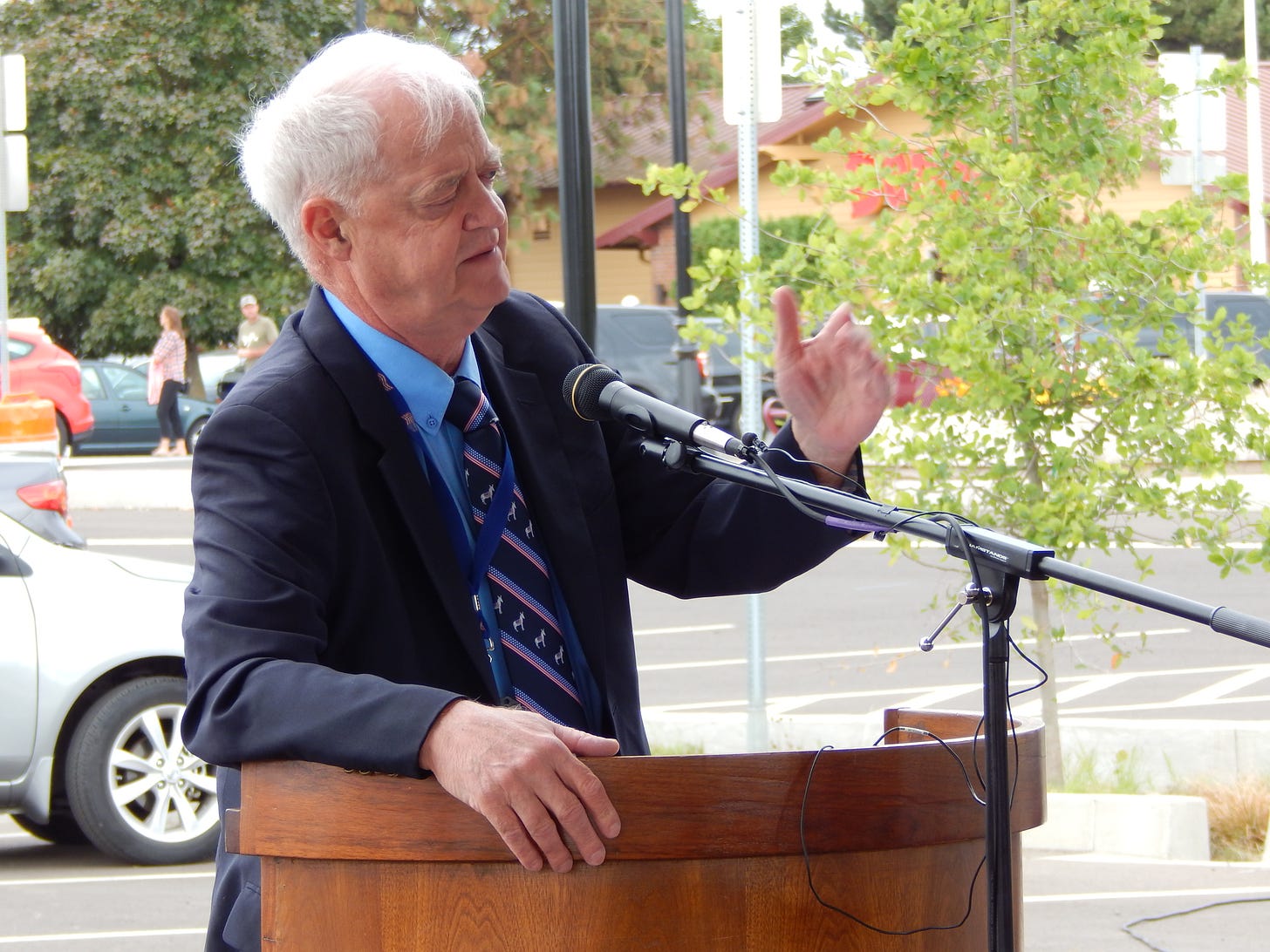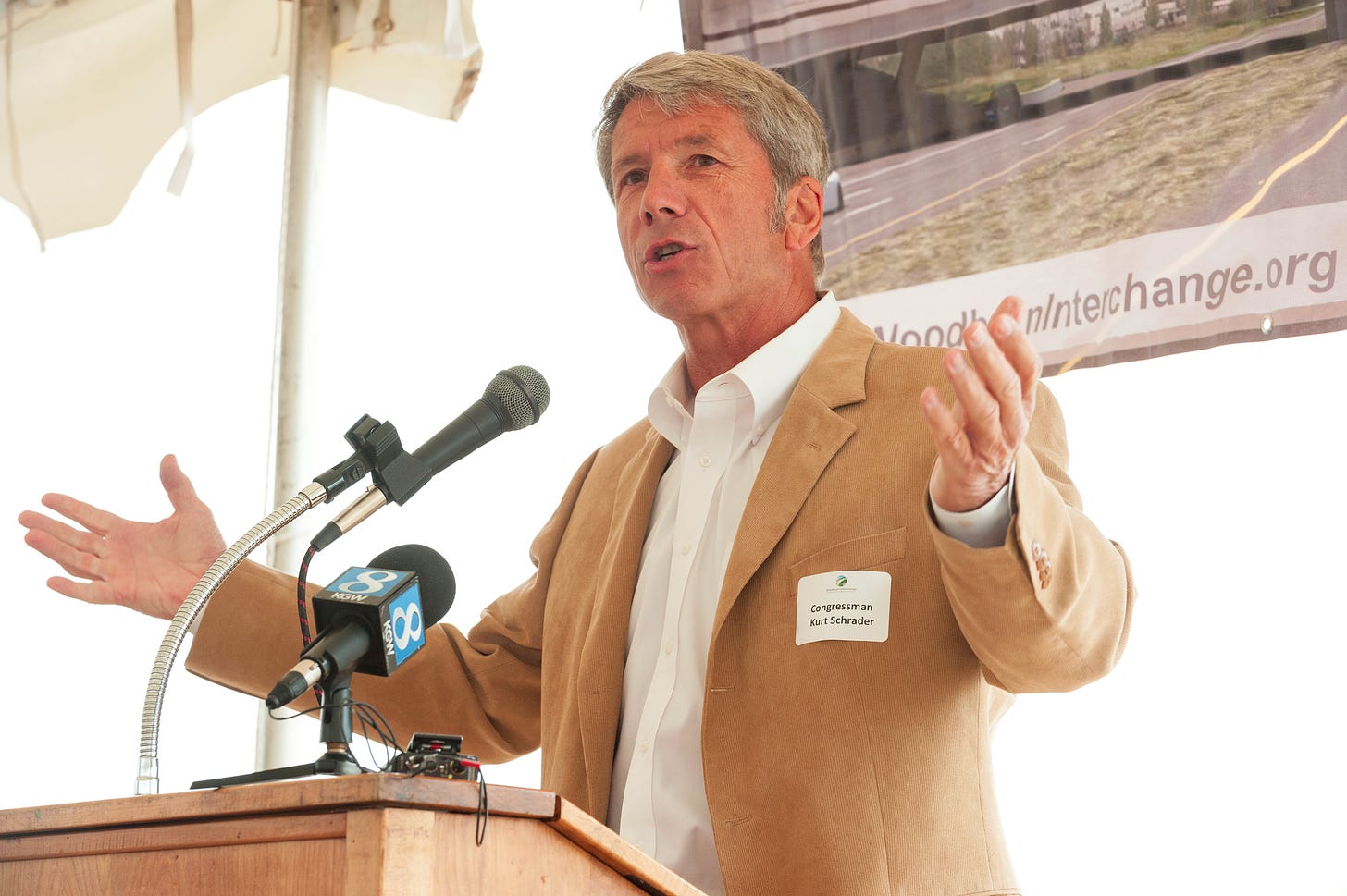The Liftoff: The gun violence debate in Oregon—and our "purple" counties
PLUS: Kate Brown's legacy; why Kurt Schrader lost; what the Gov. race polling means; Phil Knight angles for the Blazers; Brian Clem joins the pod; and more!
Welcome back to The Liftoff!
Usually, we ask our subscribers to consider upgrading to become a paid subscriber for just $10 per month (we hope you will!).
This week, we have another ask: please forward this email to 1-2 friends or colleagues to help us grow our audience.
1. How is the gun violence debate playing out in Oregon?
The mass shooting in Uvalde, Texas, which killed 19 students and 2 teachers, has reignited the gun violence prevention debate in Oregon. Here are some key developments over the last week:
The O provided a quantitative analysis of gun purchasing in Oregon: “Last year, state police approved 320,735 gun purchases and denied 1,129 purchases after conducting background checks.”
Oregon will soon have its own gun violence research center, led by an epidemiologist, funded by a foundation grant.
Betsy Johnson is changing her tune on gun control. After numerous public statements and votes against gun control legislation, she now says she is open to additional publicly-supported reforms—even if they don’t represent her own “views and concerns”. This is reminiscent of Dennis Richardson’s campaign for Secretary of State, where he (successfully) promised to set aside his personal views in fulfilling the duties of the office.
The O reported that Johnson owns a Cold War-era machine gun as part of her extensive gun collection.
In 2019, the legislature passed a bill that allows school district to ban guns on campus—but only 13% of districts have enacted the ban, according to OPB. That number is expected to rise.
A preview of what’s to come: A statewide campaign, led by an interfaith coalition, is seeking to pass gun safety measures via ballot measure this November—but they face a steep obstacle of signature gathering in the next month to qualify. Meanwhile, six Democratic legislators are pledging “bold action” on gun violence in the next legislative session.
2. Governor’s race: what the polling means
The three-person race for governor is far harder to predict than previous elections. At this early stage of the race, the two main questions seem to be:
Can independent candidate Betsy Johnson win?
If she doesn’t win, which candidate will she take the most votes from: Democrat Tina Kotek or Republican Christine Drazan?
GOP consultant Reagan Knopp has an answer to the first question, after analyzing the conditions that helped elect 7 independent governors over the last 40 years in the United States (and reviewing preliminary polling from this year). His summary? “Electoral history and the polls both say Betsy Johnson will make history in 2022. She will spend more money than ever before to come in third place.”
A new poll from Nelson Research suggests that Johnson is currently taking a larger share of support from Democrats than Republicans, helping put Drazan ahead of Kotek by two points (within the margin of error). Johnson is eight points behind Kotek (29.5% to 28.5% to 19.4%).
Reality check: Polls represent a snapshot in time. Tens of millions of dollars are likely to be spent between now and the election in an attempt to influence voters’ perception of the three candidates—and Betsy Johnson’s legislative record and fundraising ability make her unlike any independent candidate in Oregon history. At this point, anything is possible.
We’ve said it before and we’ll say it again: this is likely to be not just the most expensive governor’s race in history—but also the most negative.
3. Legislative news: Moderate Dem takes the lead in Lake Oswego house race and Peter Courtney recovers from COVID
Senate President Peter Courtney, who is double-boosted, recovered from COVID-19 and presided over the senate during legislative days.
Business-friendly City Councilor Daniel Nguyen has taken the lead in the HD38 primary (Lake Oswego) over progressive School Board Member Neelam Gupta. Nguyen was supported by Brian Clem’s PAC while Gupta was supported by most labor groups. It’s still too close to call.
The Oregon Health Authority has announced how it will spend a record legislative investment of over $500 million allocated for behavioral health services and treatment programs (separate from Measure 110 investments).
4. Former State Rep. Brian Clem talks his new PAC and advice for Dems heading into 2022
Brian Clem is a well-known figure in Oregon politics. Before retiring, he was one of the leading moderate Democrats in the state house, serving for over a decade. In his retirement from the legislature, he helped launch a PAC called Oregonians Are Ready, which supported more moderate or business-friendly Democrats during the 2022 primary election with over $125,000 in spending. Clem actively considered running for Congress this cycle before ultimately declining (which we talk about in the episode).
We also talk about Clem’s legislative accomplishments, why he started his new PAC, and his advice to Democrats running in rural areas in this year’s tough political environment. We cover how Clem’s rural background informed his political views–and his close relationship with the late Rep. Vic Gilliam (including the infamous story of every member of the House, Republican and Democrat, marching to Senate President Peter Courtney’s office in protest).
5. Oregon’s “purple” counties
Years ago, Washington County was considered a “purple”, “swing”, or “bellwether” county—it’s now considered “blue”, with a handful of moderate Republicans and independents serving in local government. Today, Oregon’s most prominent “purple” counties are Clackamas, Lane, and Deschutes—all with large populations and heterogenous political beliefs. Some highlights:
Commission races in all three counties are expected to be razor-close:
Both seats on the Clackamas County Commission up for election (held by Republican Paul Savas and Democrat Sonya Fischer) are headed for runoffs in November. Savas is currently less than 1% ahead of challenger Libra Forde.
In Lane County, all three commission races were incredibly close. Progressive Dawn Lesley and conservative Ryan Ceniga will head to a runoff (separated by less than 2%), conservative David Loveall has defeated incumbent Democratic Commissioner Joe Berney with 50.13%, and incumbent Democratic Commissioner Heather Buch defeated her challenger with 51.11%.
Deschutes County has partisan primaries for commissioners—but nearly the same number of Democrats and Republicans voted in the primaries for both seats.
New mistakes in Clackamas County: an error by county officials led to misreporting vote totals in three races, which have since been fixed. A spokesperson for Secretary of State Shemia Fagan said the Clackamas County process is “not typical”.
Election night is stretching into “election weeks” in Clackamas County, and WW reports that this could turn into one of the longest gaps between election night and final results in Oregon history.
Why does this delay matter? Imagine the race for governor is too close to call on election night this November (like it was as recently as 2010). Weeks of waiting for a significant number of ballots to be counted, particularly if results are misreported, will inevitably create distrust, confusion, and potentially chaos.
6. Big-ticket items to pay attention to
The Blazers: Adrian Wojnarowski, perhaps the best-sourced NBA journalist, reports that Phil Knight is aggressively attempting to purchase the Portland Trailblazers (the Blazers’ official statement is that the team is not for sale but…take it with a grain of salt). Following the death of her brother Paul Allen, Jody Allen effectively owns the Blazers as the trustee of his trust. NBA Commissioner Adam Silver says that the team will be for sale at some point—and he hopes they stay in Portland.
Measure 110 Implementation: According to a “risk letter” from Secretary of State auditors, there are several significant problems with OHA’s implementation of Measure 110 (both related to and separate from the delays in distributing funds).
The Housing Crisis: The numbers behind Oregon’s housing crisis: over the last 20 years, Oregon has under-built by 111,000 housing units. By one measure, Hood River and Bend are the least affordable communities in the state.
7. News round-up: Kate Brown’s legacy and why Kurt Schrader lost
One of Kate Brown’s legacies as governor? Appointing over 100 people to judicial positions, including a majority of Supreme Court justices.
Congressman Kurt Schrader offers his explanation for why he lost (including Portland, Bend, California, Seattle, and socialists).
State Treasurer Tobias Read has endorsed his former rival Tina Kotek.
Kotek also scored a national profile from NBC News: “Meet Oregon's Tina Kotek, who hopes to be America's first lesbian governor”
WW reports that three of the SuperPACs supporting Carrick Flynn all had the same donor.
From the Oregon Capital Chronicle: “Oregon ag officials give tentative approval to controversial Foster Farms chicken facility”
The Saudi-sponsored golf tourney is still on—and some local mayors think its ”despicable” and “horrible”.
Redmond Mayor George Endicott announced he will not run for re-election. He has served as mayor since 2008.
The CEO of Portland-based grocery chain New Seasons Market, Nancy Lebold, stirred backlash after urging staff not to unionize.
From WW: Following a surprise interview with Betsy Johnson at TEDxPortland, the Oregon Department of Justice has received a number of complaints about the nonprofit.
Thank you for reading.
Tips? Feedback? Ideas? Corrections? We want to hear from you! Email benjaminwbowman@gmail.com.
If you value this newsletter, please become a paying subscriber today. Your support will help us grow and offer more opportunities to this community. It’s just $10 a month!
Interested in advertising with us? Get in touch!
About the Authors
Ben Bowman is the chair of the Tigard-Tualatin School Board and a Democratic candidate for Oregon House District 25 (Tigard and Beaverton). In his day job, he works for the Oregon Department of Education. Previously, he worked as a legislative aide for former Reps. Margaret Doherty and Val Hoyle. He also co-hosts The Oregon Bridge podcast. In the newsletter and podcast, he speaks only for himself.
Alex Titus is a small business owner and consultant to businesses, nonprofits, and associations. Previously, he served as an Advisor in the Trump Administration and as a Policy Advisor to President Trump’s Super PAC. His writing has appeared in National Review, Fox News, The Hill, RealClearPolitics, and other publications. He also co-hosts The Oregon Bridge podcast.










